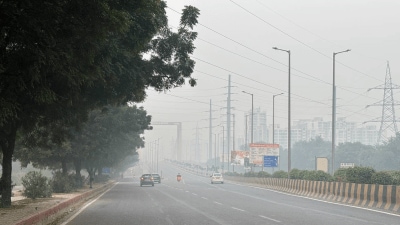Stay updated with the latest - Click here to follow us on Instagram
2002 – 2003 Mumbai blasts case: 10 held guilty, 3 acquitted
There were three more accused who were acquitted of all charges, with the prosecution admitting that evidence against them was lost due to key witnesses turning hostile.
 Saquib Nachan, the prime accused. File
Saquib Nachan, the prime accused. File
A special court convicted 10 men Tuesday in connection with the three serial blasts in Mumbai that occurred between December 2002 and March 2003, killing 12 persons and leaving 27 injured. While four of the ten were found guilty of committing and planning to commit terror act, six others were charged under the Prevention of Terrorism Act for possessing unauthorised firearms.
Also read | 13 yrs, 13 surgeries later, verdict doesn’t mean much to terror victim
There were three more accused who were acquitted of all charges, with the prosecution admitting that evidence against them was lost due to key witnesses turning hostile.
[related-post]
The most serious charges were against Muzammil Ansari, who was found guilty on 18 counts, including planting bombs at the Mumbai Central railway station, Mungibai Market in Vile Parle East and on a Karjat-bound local train.
Gulam Akbar Abdul Sattar Khotal, Farhaan Abdul Malik Khot and Dr Wahid Abdul Jabbar Ansari were convicted for the serious charge of committing or inciting the commission of a terrorist act under the now repealed Prevention of Terrorism Act.
The verdict was announced in an open court Tuesday, 14 years after the terror attacks. Judge P R Deshmukh of the Special Prevention of Terrorism Act (POTA) court called each accused to the witness box and announced the verdict to him.
The acquitted trio — Mohammed Nadeem Mainuddin Paloba, Haroon Rashid Mohammad Yamin Lohar and Adnan Bilal Mulla — was summoned to the witness box together. Cheers from the rear of the packed courtroom greeted declaration of their release. Adnan let out a long sigh, rubbed both eyes with his fingers and for a few seconds buried his face in his hands, before redirecting his attention to the judge.
Saquib Nachan, the prime accused and former general secretary of now-banned Students’ Islamic Movement of India (SIMI), was convicted under POTA for less stringent charges of possessing illegal firearms.
Ateef Nasir Mulla and Hasib Zubair Mulla were convicted for possessing illegal firearms under POTA, while Mohammed Kamil, Noor Mohammed Abdul Malik Ansari and Anwar Ali Javed Ali Khan, were charged for the same offence under the Indian Arms Act.
According to the prosecution, the attacks were facilitated with the help of Lashkar-e-Toiba. The police have also shown five persons as absconding in the case. One of them is Tahir alias Yusuf Shaikh, who along with Muzammil planted the explosives.
Over the next two days, the court will hear arguments from the accused regarding their sentencing.
On Tuesday morning, judge Deshmukh made a short address to the court before proceeding to announce his verdict. The judge expressed his gratitude to special public prosecutor Rohini Salian and the defence lawyers and noted that the case, which had been going on for the last 13 years, “would not come here today” had it not been for them.
Judge Deshmukh said, “I have tried to appreciate both the evidence. This is not the last court. Some might be pleased and some might not. I have tried to give justice.”
The first explosion had taken place at the Mumbai Central railway station on December 6, 2002, followed by two more blasts over the next three months — at Mungibai Market in Vile Parle East on January 27, 2003, and inside the compartment of a Karjat-bound local train when it approached Mulund railway station on March 13, 2003.
The prosecution had charged the convicts with training to use weaponry at Padgah Hills near Mumbai and conspiring to avenge the demolition of Ayodhya’s Babri Masjid, the 2002 communal riots in Gujarat and also to kill RSS leaders.
During the course of the long-drawn trial, which had been stalled for several years due to a stay imposed by the Supreme Court, the prosecution examined 154 witnesses. After charges were framed against the accused, the defence put forward 30 witnesses.
Several of the prosecution witnesses turned hostile through the course of the trial, including all witnesses living in Padgha village. “There was no direct evidence. There was only circumstantial evidence and we put bits and bits together,” Salian said, adding that no eyewitness came forward.
The clinching evidence, according to the prosecution, were the shells of bullets recovered by the police from Padgha Hill. Salian said forensic tests matched these with firearms seized from the possession of Nachan, Hasib Mulla and Ateef Mulla.
As many as 250 iron castings of explosives and two half-made explosives were also recovered from the inside a well near a mosque in Padgha after Farhaan Abdul Malik Khot led the police there.
The hostility of witnesses resulted in the prosecution failing to prove where the weapons had been acquired by the accused from, as well as their association with each other.
Salian added that the accused were divided into groups based on their location — Padgha, Kalyan and Kurla. “Some association was missed because of (the) hostility,” she said.
The prosecution was, however, able to match traces of explosives recovered from the crime scenes with those recovered from the Kurla clinic of Dr Wahid Abdul Jabbar Ansari. According to the prosecution, Muzammil Ansari picked up the explosives used in the blasts from the clinic.







